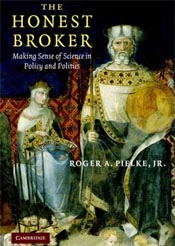 Roger Pielke’s Book, The Honest Broker, highlighted in an NPR article
Roger Pielke’s Book, The Honest Broker, highlighted in an NPR article
Are Scientists Naive About Politics?
by Adam Frank
Climate change is not the only place scientists and politicians get in trouble with each other. Energy policy, endangered species, stem cells, heck, even defining what constitutes a healthy diet can cause tension between the domains of policy and the domains of research.
Scientists say they just want to stick to the data and politicians say the world isn’t that simple. So, who is right and who is really being simplistic about the way the world works?
I have been sweating over this question ever since starting the 13.7 blog. Trying to take my role as a science communicator seriously, I struggle to balance my values as a human being with my commitment as a scientist to let the world speak for itself.
Turns out this balance is exactly the crux of the biscuit when it comes to science and policy.
 Recently I stumbled across The Honest Broker: Making Sense of Science in Policy and Politics by Roger A. Pielke, a professor with the Environmental Studies program at the University of Colorado. His book is short but cuts deeply across the core issue for our era: we can’t escape the impact of science in culture and yet we don’t understand how to use science in consciously and wisely shaping culture.
Recently I stumbled across The Honest Broker: Making Sense of Science in Policy and Politics by Roger A. Pielke, a professor with the Environmental Studies program at the University of Colorado. His book is short but cuts deeply across the core issue for our era: we can’t escape the impact of science in culture and yet we don’t understand how to use science in consciously and wisely shaping culture.
The topic is important enough for more than one post. So, for today, let’s start with a simple question. What do you think the relation between science and policy should be? Most folks, including most scientists, would answer this question with the so-called “linear model” of science and policy. As Pielke puts it:
The linear model is often used to suggest that achieving agreement on scientific knowledge is a prerequisite for political consensus to be reached and then policy action to occur. Read more …

